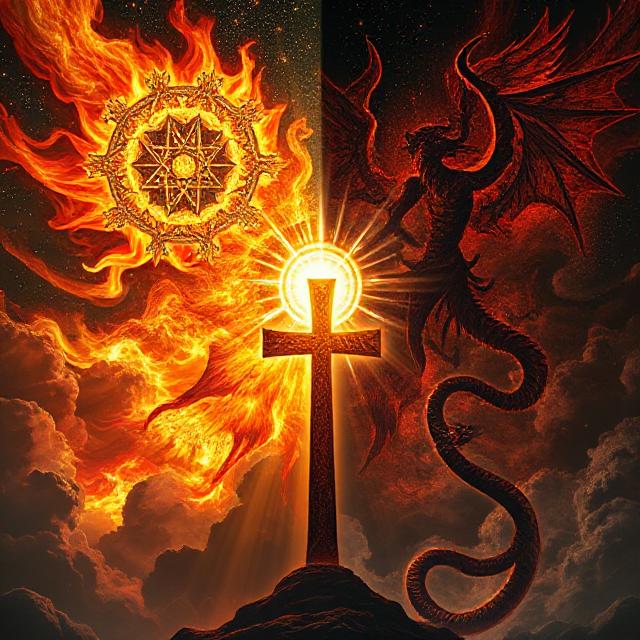
Table of Contents
Dualism in Zoroastrianism vs Christianity: Two Visions of Good and Evil
Dualism in Zoroastrianism vs Christianity reflects two of the most influential frameworks for understanding the cosmic tension between good and evil. Both traditions present the universe as a battleground—spirit vs. flesh, light vs. darkness, God vs. adversary. But while their imagery and themes often overlap, the metaphysical structures behind them differ dramatically. One enshrines true dualism; the other ultimately insists on divine unity.
This article unpacks the origins, cosmology, and theological implications of dualism in these two faiths, highlighting where they converge, diverge, and continue to shape human thinking.
I. What Is Dualism?
Dualism is the belief that reality is fundamentally composed of two opposing principles. In religion, this usually takes the form of cosmic or moral dualism—light vs. darkness, good vs. evil, spirit vs. matter.
Philosophically, dualism contrasts with monism, which holds that reality is ultimately one. The challenge for dualistic systems is to explain the origin, persistence, and eventual resolution of this cosmic conflict.
Zoroastrianism and Christianity both speak of divine beings locked in struggle. But are their dualisms equivalent?
II. Zoroastrian Dualism: Cosmic Opposition
Origins and Texts
Zoroastrianism, founded by the prophet Zarathustra (Zoroaster) in ancient Persia (circa 1500–1000 BCE), is the world’s oldest known dualistic religion. Its sacred texts, the Avesta, lay out a vision of stark moral polarity.
Core Beliefs
At the heart of Zoroastrian dualism is the opposition between:
- Ahura Mazda: the Wise Lord, source of light, truth, and order (asha)
- Angra Mainyu (Ahriman): the Destructive Spirit, source of deceit, darkness, and chaos (druj)
These two spirits are locked in an eternal battle that spans both the material and spiritual realms.
Zarathustra’s theology teaches that human beings must choose between these forces. Their free will contributes to the eventual triumph of good, culminating in a cosmic renewal (Frashokereti) in which evil is defeated and harmony restored.
Theological Implications
Zoroastrianism is often labeled a true dualism, since it posits two co-eternal principles—good and evil—without reducing one to the other or subsuming both into a single divine essence.
This dualism is metaphysical and moral: evil is not merely a lack or corruption, but an independent force with real agency.
III. Christian Dualism: Conflict Within Monotheism
Roots and Development
Christianity emerges from Jewish monotheism, and maintains strict belief in one God. However, it also incorporates a strong dualistic narrative: God vs. Satan, Heaven vs. Hell, spirit vs. flesh.
Key texts like the New Testament and the Book of Revelation present vivid images of cosmic battle, spiritual warfare, and ultimate judgment.
Key Dualistic Elements
- God: omnipotent, omnibenevolent, creator of all
- Satan: a rebellious angel, tempter, and accuser who seeks to destroy
- Human condition: torn between sinful nature and divine grace
This moral tension drives Christian theology, particularly in the Pauline epistles, which contrast the flesh (worldly desire) with the spirit (divine calling).
Yet Christianity insists that evil is not equal to God. Satan is a created being, and his rebellion is temporary. In the end, good will triumph because God’s will is absolute.
Theological Resolution
Christian dualism is ultimately asymmetrical. It may feel dualistic experientially, but it remains monotheistic in structure. Evil is a distortion of good, not its opposite in essence.
The Cross and Resurrection are framed as the decisive blow to Satan’s dominion. The final judgment restores divine order, not by balance, but by conquest.
IV. Comparing Zoroastrian and Christian Dualism
| Element | Zoroastrianism | Christianity |
|---|---|---|
| Core Conflict | Ahura Mazda vs. Angra Mainyu | God vs. Satan |
| Nature of Evil | Independent, eternal force | Created, contingent being |
| Resolution | Cosmic purification (Frashokereti) | Divine judgment and restoration |
| Role of Humanity | Co-creators of destiny through ethical choice | Redeemed by grace, but responsible for moral choice |
| Ontology | Metaphysical dualism | Moral dualism within monotheism |
While both religions dramatize the moral conflict of the human soul, Zoroastrianism grounds this in cosmic parity. Christianity, by contrast, frames the conflict as a temporal rebellion destined for defeat.
V. Influence and Legacy
Zoroastrian Influence on Christianity?
Some scholars argue that Zoroastrian ideas may have influenced Jewish apocalypticism during the Babylonian Exile, and later Christian eschatology. Elements such as:
- Final judgment
- Resurrection of the dead
- A cosmic savior
- Dualistic struggle
…appear in both traditions. However, Christianity reinterprets these themes within its monotheistic framework.
Cultural Resonance
The dualism in both religions shaped later philosophical and artistic expressions:
- Medieval demonology and angelology
- Modern stories of good vs. evil (e.g., Lord of the Rings)
- Ethical systems based on internal moral struggle
Zoroastrianism, though diminished in numbers, left a profound legacy on notions of moral clarity and eschatological hope.
VI. Conclusion: Two Visions of Conflict and Hope
Dualism in Zoroastrianism vs Christianity shows how two civilizations grappled with the same existential question: Why does evil exist, and can it be overcome?
- Zoroastrianism presents a cosmic battlefield between two uncreated forces—the war is real, and humanity is a vital player in tipping the scales.
- Christianity presents a dramatic moral conflict, but under the sovereignty of a single Creator, who allows evil for a time before vanquishing it.
In both, the human journey matters. Our choices shape our souls and, perhaps, the very fate of the cosmos. Whether by choosing light (asha) or walking in the Spirit, these ancient visions remain potent today.
The war between light and darkness, whether metaphysical or moral, is not just a story of gods—it is the story of each of us.
